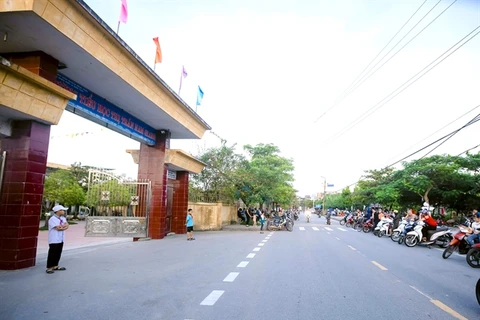 Suspects of an online scam ring in the northern province of Thai Binh arrested on July 13. (Photo: VNA)
Suspects of an online scam ring in the northern province of Thai Binh arrested on July 13. (Photo: VNA) H., an accountant of a State-owned agency, said she received a message from her sister-in-law earlier this month on Facebook telling her to quickly transfer 5 million VND (211 USD).
She called to check the situation but couldn't hear her sister-in-law clearly. She still transferred the money.
Her sister-in-law then informed her friends on Facebook that the account was hacked and the perpetrator had tried to scam people by asking to borrow money.
P.T.N in Ba Vi district of Hanoi got a call from a person claiming to be a police officer, informing her that she had violated the law and she must transfer money to serve the investigation.
After hearing the threats of the person, she followed the instructions and went to Agribank’s Ba Vi branch, to withdraw all her savings of 260 million VND (11,030 USD) to transfer to the person. Fortunately, the bank suspected wrongdoing and informed the police.
L. K., of Ho Chi Minh City, told Vietnamnet that he received a message from his close friend asking him to transfer 30 million VND (1,270 USD).
Although his friend just posted a status of the results of a football match a few minutes ago, K. still called him to make sure the message was legitimate.
When the call connected, he saw his friend on video who said “I’m listening.” K. felt secure and transferred the money.
The next day, when the friend posted on his Facebook that account was hacked, K. knew he was a victim of scammers.
Online scams on the rise
Statistics from the Authority of Information Security revealed that in the first six months of this year, online fraud in Vietnam increased by 64.78% over the same period last year and 37.82% compared to the last six months of last year.
The report focussed on 24 types of scams prevalent in Vietnam, including brand impersonation, account hacks and other combinations, the authority said.
According to Tran Quang Hung, acting deputy director of the authority, fraudsters have taken advantage of modern technologies to create sophisticated and effective fraud systems that are difficult to identify.
Groups of people that are often scammed include the elderly, children, students, and low-income workers, who have lower ability to recognise signs and acts of fraud.
Online scammers are not only located in Vietnam, but also in other countries. The rings of scammers in foreign countries also include Vietnamese.
Hung said that recently the authority discovered that fraudsters not only used one application but also used 195 different applications to trick people into installing online tax payment applications to perform online public services with tax incentives, then they will scam to get bank account numbers of users, and steal money from them.
Solutions
According to the authority, in addition to applying technology to prevent online scams, another important thing is to promote communication and dissemination of online scams to as many people as possible.
"When each citizen knows how to identify forms of fraud, they will be more vigilant,” Hung said.
Therefore, the ministry launched the campaign "Action month to disseminate identification and prevention of online fraud" between June 23 and July 23, he said.
The campaign had been widely covered in the media and on social networks to provide adequate information about online fraud to people, through video clips of popular online scams, guidance on identifying 24 types of scams, and providing a set of manuals to help citizens protect themselves and their families in cyberspace.
Recently, many people had informed relevant State agencies about forms of online fraud. It helped the agencies detect and promptly disseminate knowledge about online fraud to other people, thereby preventing online scams, he said./.
VNA























